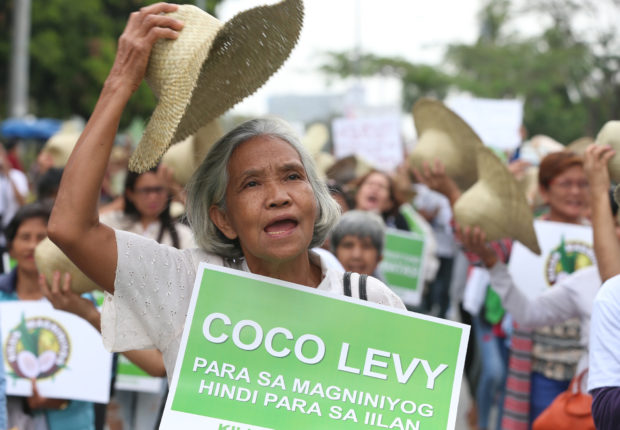Quezon governor backs Marcos, but wants assurance coco levy fund will be returned to farmers

MARCH 12, 2018 Hundreds of Coconut farmers and supporters of KILUS Magniniyog march to the Senate to demand the immediate approval of Senate Bill (1233) or the Coconut Farmers and Industry Trust Fund Bill. INQUIRER PHOTO / EDWIN BACASMAS
TIAONG, Quezon — While throwing his support for Ferdinand “Bongbong” Marcos Jr., Quezon Gov. Danilo Suarez has found himself in a curious place of seeking an assurance from the presidential bet to have the coco levy funds returned to coconut farmers.

Suarez is referring to the monies collected from the coco levy, a tax imposed by Marcos’ father, the late President Ferdinand Marcos Sr., on the produce of coconut farmers, supposedly to develop the coconut industry.
“Gusto lang namin makita ‘yung assurance niya because kami ay coconut-producing province—na tutulungan niya kami na suportahan ang coco levy para maibalik sa aming mga magsasaka ‘yung perang talaga namang sinabi na ng Supreme Court na it will not go anywhere except to the farmers,” Suarez said in an ambush interview Tuesday.
(We want to see an assurance from him because we are a coconut-producing province. We want to see that he will support the return of coco levy fund to the farmers. The Supreme Court has already said that the funds will not go anywhere except to the farmers.)
Article continues after this advertisementSuarez said he has not asked Marcos Jr. regarding the matter.
Article continues after this advertisementAccording to the Presidential Commission on Good Government (PCGG), the coco levy fund originated in 1971 when then President Marcos and his close cronies imposed tax on coconut farmers through Republic Act No. 6260, which called for the creation of a Coconut Investment Fund and a Coconut Investment Company.
From 1973 to 1983, a total of P9.695 billion in coco levies were collected from farmers, the PCGG said.
“But these coco levy funds were not used to benefit the farmers; instead (these funds were) diverted to purchase the United Coconut Planters Bank and San Miguel Corporation for the benefit of Marcos [Sr.] and his cronies,” the PCGG said in its website.
After the fall of the Marcos regime, the benefits promised to the farmers were not materialized and various suits were filed to give farmers the fund’s control.
In 2012, the Supreme Court declared that the coco levy fund belonged to the government for the benefit of the country’s coconut farmers. Up to now however, the implementation of the ruling on the coco levy has been tied up.
No scam involved
Without providing a concrete explanation and despite the pronouncements from the PCGG, Suarez believes there was no scam under the Marcos leadership in relation to the coco levy fund.
“Ang coco levy, the money was never stolen. It was there, kumita nag-interest lahat. Ang hindi lang talaga napa-implementa ay yung ruling ng Supreme Court during ng time ng dilawan that it should be reverted back to the coconut farmers,” Suarez said.
(Ang coco levy, the money was never stolen. It was there, it garnered interest. However, the Supreme Court ruling that it should be reverted back to the coconut farmers was not implemented by the ‘yellows’.)
Asked if he believes Marcos will commit to returning the coco levy fund to farmers when the controversy stemmed from the presidential candidate’s father’s presidency, Suarez said: “I don’t think Bongbong will be affected by cronyism.”
“I can see his sincerity. He wants to do something, maybe go back to the glory of his father,” Suarez said.
RELATED STORY:
Supreme Court affirms ruling on coco levy: SMC’s 24% goes to government
Duterte signs law creating coco levy trust fund